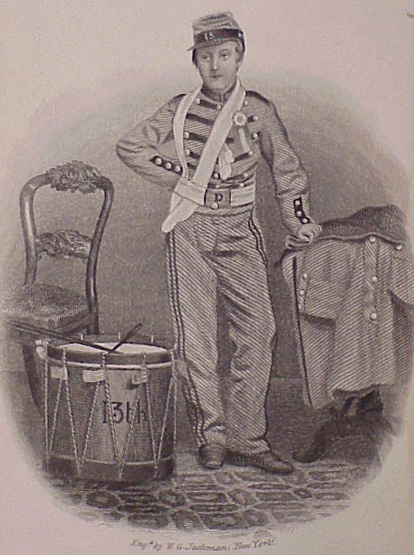As we have learned in previous posts regarding the role of drummer boys in the civil war, their duties comprised far more than tapping our rythyms; theirs was an important, and often dangerous job. Clarence D. McKenzie, the young drummer for the 13th Regiment, New York State Militia, paid the ultimate price when he was felled by an accidental discharge from a musket. McKenzie was 12 years old when he fell for the final time. His story is a reminder that war is very real and very lethal, regardless of how frequently and to what extent it is often romaticized.
In his tribute to young McKenzie, Luther Goodyear Bingham dscirbes the funeral procession as such:
The funeral of Clarence D. McKenzie, the little drummer boy, who was killed by the accidental discharge of a musket at Annapolis, Maryland, took place from St. John's Church, corner of Washington and Johnson streets, Brooklyn, at four o'clock in the afternoon of the fourteenth day of July. The body was removed under military escort from the house of the bereaved parents, No. 23 Liberty street, and placed in front of the pulpit. More... The children of Public School No. 8, and of the Sunday school connected with the Presbyterian church, corner of Tillary and Lawrence streets, to which deceased had been attached, were present and also occupied a large portion of the building. Many wore the emblem of mourning and showed sincere grief at .the loss of their friend and former school mate. The press was so great that thousands could not gain admittance.— The streets about the church were literally packed with spectators.
After the funeral services the face of the little drummer was exposed to view, and his former companions and class mates passed by and cast a last, sorrowful look upon it. This occupied perhaps half an hour, when the body was borne to the hearse by some of the soldiers of Company D, who brought it to this city. The coffin was enveloped in the American flag, and covered with wreaths of flowers and evergreen. The members of the Thirteenth Regiment now in this city, and the reserve corps, the whole under comman of Captain Balsdon, of Company D, formed the escort. Four drummers rolled the funeral march on the way to Greenwood Cemetery, where the body was interred. Three rounds of musketry were fired over the grave, and the solemnities were concluded.
The little brute companion of the drummer boy — his little faithful dog, followed the hearse to the grave, and when the coffin was lowered into it, he went forward and looked attentively down into the grave, to see where they had laid his young master. When the volleys where fired he ran away. When the procession moved away he remained, and when the grave was filled, laid himself down upon it. For many nights afterwards he was in the habit of going and spending a part of the night upon the grave, and toward morning he would return to the house where he belonged.


No comments:
Post a Comment